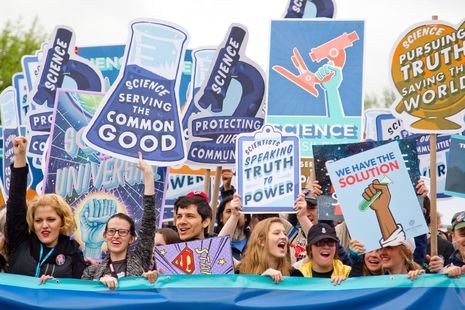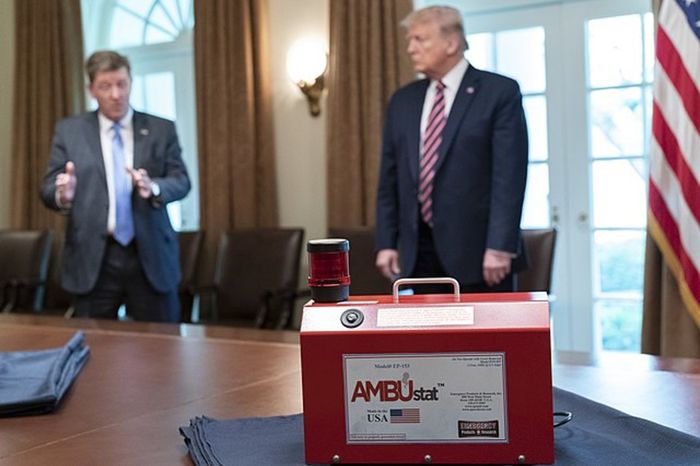Trump’s comments on Tylenol: how science is being weaponised
Laura Verdina unpacks how the White House’s flawed interpretation of the evidence and their attempts to ‘cure’ autism can only serve to halt progress

Yet again, Donald Trump has made headlines for his choice interpretation of medical science – this time claiming that the use of Tylenol, a painkiller containing acetaminophen (paracetamol) as its active ingredient during pregnancy is a cause of autism in children.
In the White House’s official statement on the claim three studies, as well as two literature reviews, are linked as evidence for acetaminophen causing autism. Although Trump uses these articles to support his claims, they all call for more research to be done on the topic.
“Untreated fever in early pregnancy has been linked to an increased risk of neural tube defects in the child”
Not only is the guidance offered by Trump rooted in a flawed interpretation of the science, his message to mothers is dangerous. Regarding Tylenol, Trump believes not only that “you shouldn’t take it during the entire pregnancy,” but also advises expecting mothers there’s “no downside in not taking it”. This goes against current medical opinion – if a pregnant woman were to have a high fever and put off taking the painkiller, this would put her at risk of complications.
In addition, untreated fever in early pregnancy has been linked to an increased risk of neural tube defects in the child. These conditions happen when the neural tube (a structure from which the brain and spinal cord forms) does not close properly during development. Examples include spina bifida, which affects the spinal cord and nerves, and can result in lifelong problems with movement, bladder and bowels, as well as anencephaly, a fatal condition in which the brain does not form correctly.
At this moment in time, only some research has found statistically significant correlations between Tylenol and neurodevelopmental disorders – many other recent studies, carried out on a variety of populations, refute the claim that there is any link to be found. Clearly, more work needs to be done to get a conclusive answer as to whether there is a concrete link here – and if so, whether there is a direct causal relationship.
“The suggestion that the recent increase in autism diagnoses is an ‘epidemic’ is a vicious way to describe a phenomenon that is more likely due to a broadened diagnostic criteria”
Many other organisations are rejecting Trump’s claims, including the UK’s Medicines and Healthcare products Regulatory Agency, which confirms that “taking paracetamol during pregnancy remains safe and there is no evidence it causes autism in children”. Wes Streeting, UK Secretary of State for Health and Social Care, also stated “I trust doctors over President Trump, frankly, on this”. The National Autistic Society has commented that Trump’s claims are “dangerous, it’s anti-science and it’s irresponsible”.
It is already becoming clear how the language being used by the Trump Administration could have a negative influence on perceptions of autistic people. This is not the first instance of the administration using such hateful rhetoric – a news briefing dating back to April of this year shows the US Health Secretary Robert F Kennedy Jr claiming that autism is a “preventable disease” and that “we know [the cause is] environmental exposure – it has to be. Genes do not cause epidemics”. The suggestion that the recent increase in autism diagnoses is an “epidemic” is a vicious way to describe a phenomenon that is more likely due to a broadened diagnostic criteria and increased awareness of the disorder.
When talking about autistic children, the US Health Secretary describes them as “kids who will never pay taxes, they’ll never hold a job, they’ll never play baseball, they’ll never write a poem, they’ll never go out on a date. Many of them will never use a toilet unassisted”. To call this description insensitive is an understatement: autism is a neurodevelopmental disorder, not a disease. Furthermore, it is experienced on a spectrum: such a wild generalisation of the people with this disorder is simply incorrect, as many autistic are capable of all the things RFK Jr claims they are not.
“The fact that the Trump Administration is cutting funding to research on autism demonstrates they have the best interests of neither researchers nor autistic people at heart”
Professor Simon Baron-Cohen, director of the Autism Research Centre at the University of Cambridge, acknowledges the importance of autistic people in academic spaces: “You can find lots of people who score high [in autistic traits], but who don’t need a diagnosis because they’ve found their niche – maybe in the maths, engineering or physics department here”. Baron-Cohen himself has been criticised by Cambridge students after delivering a “binary presentation” of autism in a talk in 2024. Nonetheless, the professor is considered to be one of the world’s leading experts on autism, and insists the language being used by Trump is “worrying,” warning there is “a real danger that we will go backwards in terms of seeing autism as negative”.
Though RFK Jr aims to “cure” autism, the fact that the Trump Administration is cutting funding to its research demonstrates they have the best interests of neither researchers nor autistic people at heart. Instead of slashing grants and looking for miracle cures, resources and funding should be directed towards providing accommodations that improve the lives of autistic people around the world. Progress will be made when efforts focus on reuniting scientists and policymakers, rather than estranging them further.
 News / Colleges charge different rents for the same Castle Street accommodation2 March 2026
News / Colleges charge different rents for the same Castle Street accommodation2 March 2026 News / News in Brief: waterworks, wine woes, and workplace wins 1 March 2026
News / News in Brief: waterworks, wine woes, and workplace wins 1 March 2026 News / Climate activists protest for ‘ethical careers policy’1 March 2026
News / Climate activists protest for ‘ethical careers policy’1 March 2026 News / Private school teacher who lied about Cambridge degree barred from teaching27 February 2026
News / Private school teacher who lied about Cambridge degree barred from teaching27 February 2026 News / Angela Merkel among Cambridge honorary degree nominees27 February 2026
News / Angela Merkel among Cambridge honorary degree nominees27 February 2026









